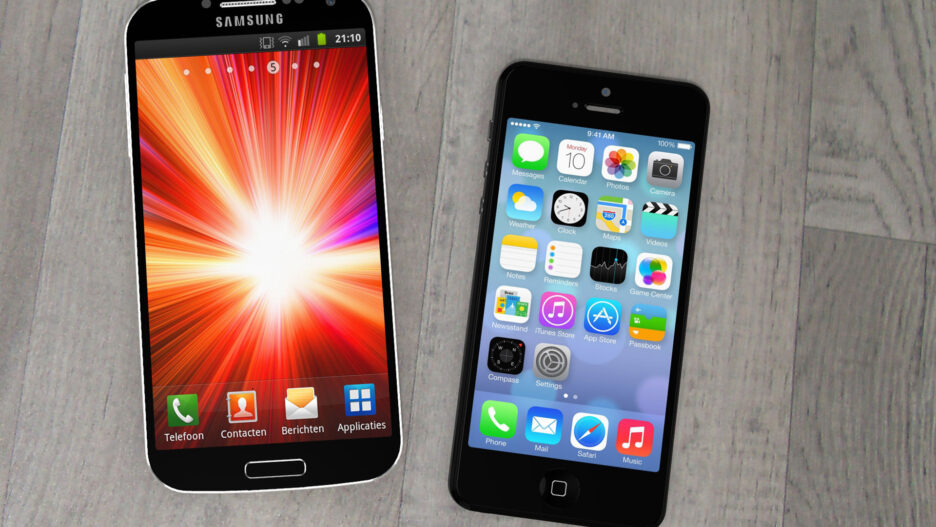Android vs iOS app development across the globe
As of 2018, there are over 5.1 billion mobile phone users. This staggering figure paints the picture of a highly connected digital landscape, where mobile apps and social media are having a field day, week, month, year and decade. And it doesn’t look as if the momentum is going to slow down any time soon.
Software companies and developers alike are constantly searching for the best mobile development platform approach. Whether it’s iOS, Android, or both, the mobile development process must be effective, efficient and successful.
For the past couple of years, the operating system market share has been dominated by Android and iOS, and for 2018 the biggest shares of the iOS vs Android development market are distributed between Android with 68% of the market share and iOS with 29.92% (see Figure 1.1 below). As a fun fact, while Android dominates the global market by a landslide, there is only one country in the world where the percentage is very different: the United States of America, where the market is almost equally divided between Android and iOS.

Figure 1.1Source: NET MARKETSHARE
These numbers speak for themselves: the battle of iOS development vs Android development is going on in market shares and revenue. Before deciding which platform suits a developers’ needs best, a number of variables and key differentiators must be taken into account to make the best and most informed decision.
Selecting the right platform to build a mobile application is only half the battle. In this article, we will go into detail about both mobile development platforms, the pros and cons of each one, and criteria to help you choose the best platform for your mobile application.
The story of the difference between Android and iOS
Android and iOS app development platforms have completely transformed the mobile application development scenery. The global app market is flooded with mobile apps targeting a multitude of users.
Both operating systems have passionate advocates who are more than happy to spread the gospel about the difference between Android and iOS. For business purposes, companies need to dig deeper to understand which platform suits their business goals best, because to be honest, there’s no straightforward winner in the Android vs iOS development dilemma.
Setting personal preferences aside, each operating system offers unique advantages and drawbacks that can make or break the mobile app development process. Thus, it is essential that a thorough review is performed before selecting just one platform or combining the two.
Overview of developing Android apps
Android is a mobile operating system designed for smartphones and tablets. This operating system was developed by Google and since its birth in 2007, it has gone through significant releases that have shaped its current state. The core Android source code is called Android Open Source Project (AOSP) and is licensed under Apache.
In most cases, Android app developers use Android Studio Integrated Development Environment (IDE) with Java programming language and the Android Software Developer’s Kit (SDK). Android is associated with proprietary software developed by Google such as Gmail, Google Search, Google Maps, Google Play, and many more.
Since 2011, Android has been the undisputed best-selling operating system for smartphones in the world. What is behind this success? What makes Android the top operating system in the market? Let’s take a look at the pros and also the cons of the Android operating system to understand its capabilities, advantages, and disadvantages.
Pros developing Android apps
- Open system: Android is naturally open to allow access to more of the system’s inner workings. This openness enables developers to build and apply features the restrictive iOS platform might not provide.
- Design: The extensive developer guidelines that Google provides in terms of design are pretty helpful in terms of designing an aesthetically pleasing layout and an intuitive user interface.
- Fragmentation: While fragmentation can also be considered a con, it can be a great advantage for developers as it allows them to create apps for a broad range of hardware such as streaming devices, wearables, TVs, in-car systems, and more.
- Publishing: Android comes up on top in terms of publishing, as it is easy, simple and quick to deploy an application into the Play Store. Once an app is ready and the development team signs off and uploads the Android PacKage (APK), it usually takes only a few hours before the mobile app is live and ready for download by end users.
Cons of Android app development
- Fragmentation: Given the open-source nature of Android, there is an extensive number of Android devices that have different screen sizes, different aspect ratios, different resolutions, and much more. Development teams must take this into account to create a responsive app design that runs smoothly across many different devices and to evaluate the impact of adding new features that may prevent users from running the app as expected.
- Testing: Given the various Android versions and multiple devices available, it is time-consuming and tedious to test with all these variables in mind.
- Costly: Because it takes a greater effort to develop and test an Android mobile app, it can cost more to develop in this platform.
Overview of iOS mobile app development
Since its appearance in 2007, iOS was specifically designed to work exclusively on Apple’s own mobile devices: iPhone and iPad. While it’s incompatible with other devices, the extraordinary popularity of Apple has made revolutionary waves in the mobile development field. Apple, while it’s not close to being the best-selling operating system, it certainly is a dominant and top-grossing competitor in terms of revenue.
With Apple’s operating system, developers create apps using the Xcode IDE with the iOS SDK. Xcode supports a variety of programming languages but Swift is the most popular programming language in iOS mobile app development, with its interactive interface, concise and expressive syntax and modern features that developers favor. This programming language was specifically created by Apple which is why it works seamlessly with iOS.
The closed source system of iOS mean that no one but Apple is allowed to use it privately. The nature of iOS mobile app development is a closed system allows developers to easily learn the entire system and operate it in a more organic way. Additionally, iOS systems have gained popularity for its secure environment that offers low probabilities of being hacked.
Pros of iOS mobile app development
- Profits: While there are many more devices running on Android and the Play Store experiences a larger number of downloads, the App Store and iOS bring in significantly more revenue. It’s a known fact that loyal iOS users are content with spending more on their app purchases.
- Fragmentation: With iOS, developers don’t have to deal with the headache of developing applications for multiple devices in mind. Instead, mobile apps are precise and ideal for the in-house iPhone and iPad.
- Simulator: There’s an industry consensus about the superior iOS emulator which is significantly better for debugging than the Android emulator.
- Standardized UI design: Given the highly detailed UI design style guides, it is easier for developers to align their app to the expected design, spending less time and effort in this area.
Cons of iOS mobile app development
- Expensive: Xcode only runs on Macs, which significantly increases the initial investment for any organization before they start developing apps in iOS.
- Stringent publishing: Apple and iOS take pride on being exclusive and restrictive about which apps to publish. Mobile apps must be formally submitted for real-life testing, which can take a few days and opens up the possibility of having an app rejected. While this exclusivity offers its benefits, it is very challenging for developers to deal with all the standards set out by iOS, which can ultimately hinder creativity.
- Customization: It is challenging to customize an app using iOS because of a variety of restrictions that iOS enforce during the app development process. This lack of customization can also affect the visibility or popularity of the app as all apps must follow standardization guidelines that make it easy to get lost with the rest of the apps.
Answering the question should you develop iOS apps or Android apps
Customers: They are the top criteria in almost any project, and it is no different for mobile app development. You must clearly define the target audience and key demographic factors such as place of residence, income, age, platform preference, and more. With this information, you can start to analyze Android vs iOS app development platforms to select the one that suits your target audience and the app. Market share and revenue: Unlike Android, iOS is exclusive and to an extent, that’s a major difference between Android and iOS. iOS is solely used by Apple devices while there are millions of devices from different brands that are suited for Android. Since there are a lot of companies that develop apps with Android, the prices are dramatically lower than iOS. This is somewhat misleading because even though the market is dominated by Android applications when it comes to revenue, Apple takes the cake.
Operating system: Features and functionalities in your mobile app are the heart of your project. Each one must be considered to assess which operating system platform is better qualified to support these requirements.
Loyalty: Customers either fall in love or completely disregard a device based on its aesthetic and operating system. While some apps have a greater chance of market penetration, it is highly important to consider that loyalty an of the target audience can significantly impact the success of a mobile app.
Conclusion
With this overview of iOS vs Android development, their pros and cons, and the criteria to consider before selecting the best option, it is clear that there’s no evident winner. As we previously mentioned, it’s important to set personal preferences aside and decide on what’s best and what works most effectively for the purpose and goal of the mobile app.
From a flexibility and customization standpoint, Android is the option to go with. The open-source aspect of Android makes it easier for developers to adjust and customize more sophisticated apps.
From a financial point of view, iOS is the right way to go. This is particularly true for startup companies that want to see a return on their investment quickly. Additionally, time is a big factor when going with iOS as the development time frames are significantly shorter.
Ultimately, if your organization is capable of handling both iOS or Android development, our suggestion is to go with the two platforms at the same time. While challenging and time consuming, it is very rewarding to see the outcomes of having your mobile app available in both app stores to penetrate the market and get the most bang for your buck.
Why Svitla?
With a talented team of skilled mobile developers, over 15 years of experience, and a wealth of knowledge in mobile app development, Svitla Systems is the right solution to any and all mobile development needs. From start-up companies to large-scale enterprises, we’ve done it all and we’ve done it well.
If you want to learn more, answer the form below so our sales team can contact you and tell you more.





